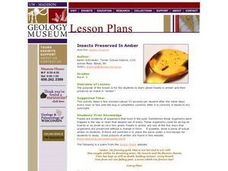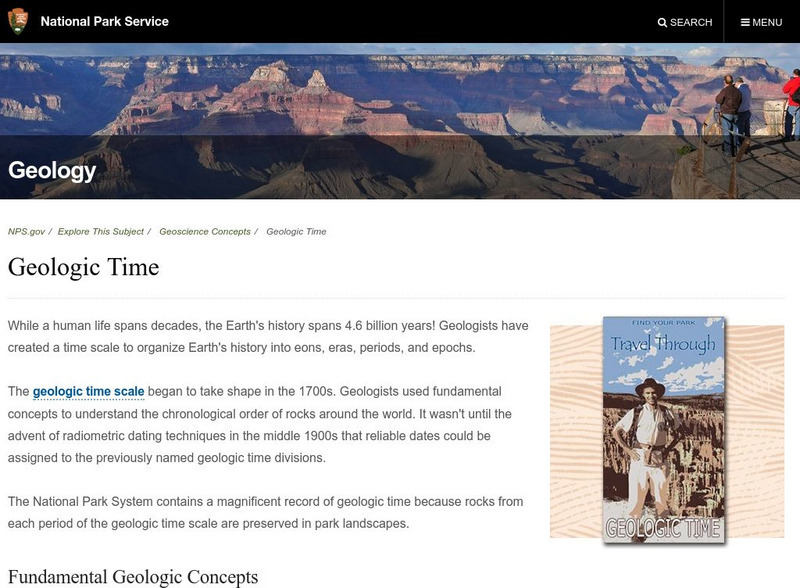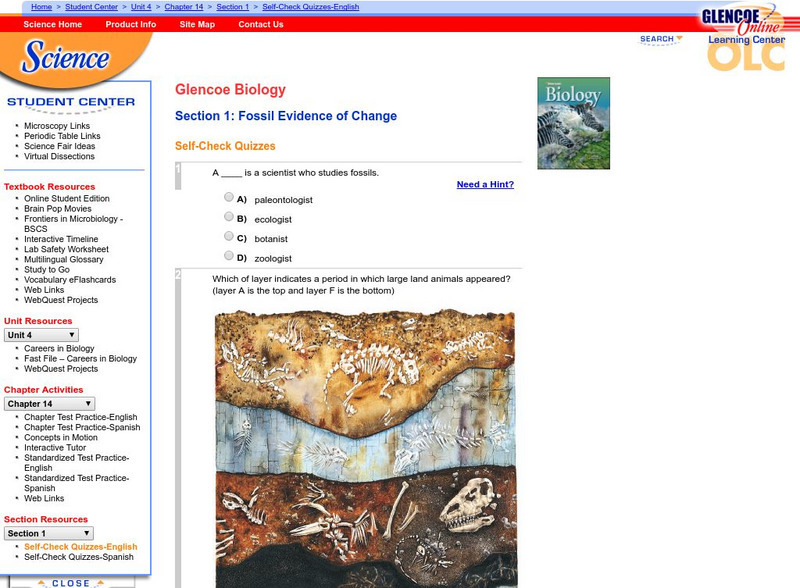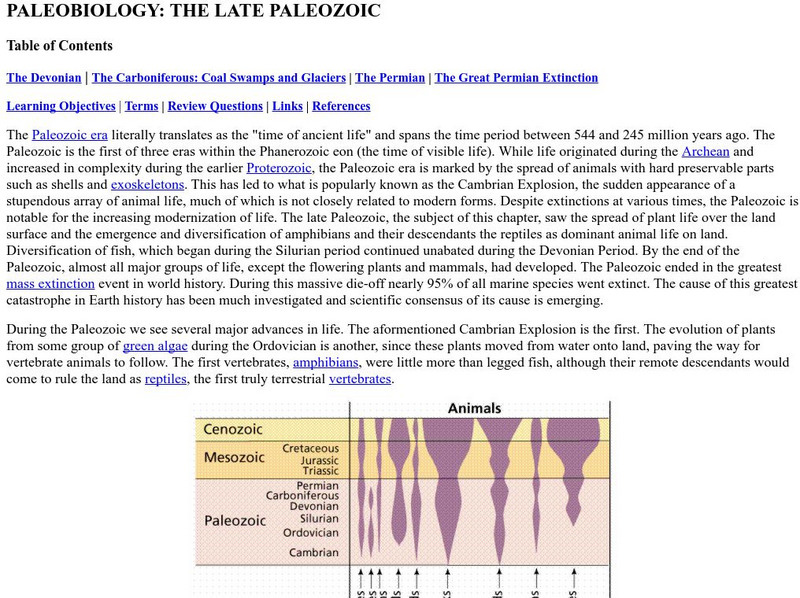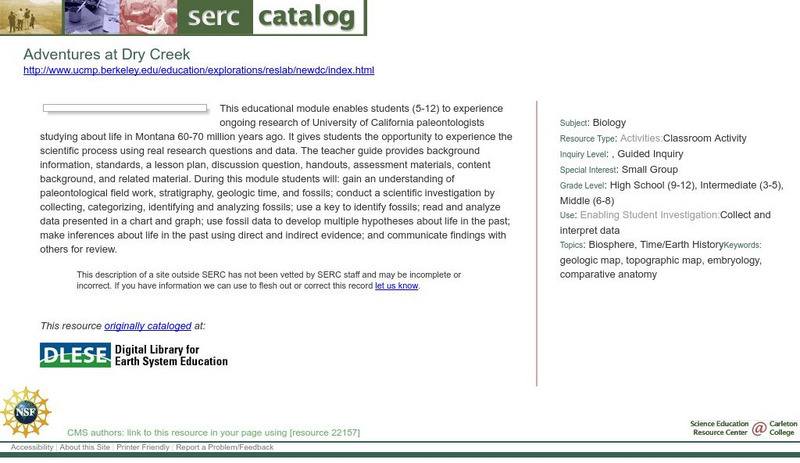Curated OER
Insects Preserved in Amber
Students examine and discuss amber and fossils in amber. They simulate the preservation of an insect in amber using glue, a dead insect, and food coloring, listen to a poem about amber, and view real amber under a magnifying glass or...
Curated OER
Timeline of Yellowstone History
Students research important dates and events in the history and development of Yellowstone National Park. They create a timeline that denotes the events after watching the associated video clips.
Curated OER
Fenwick Island, Maryland And Beyond: Who Owns the Sand?
Students examine beach processes and complex beach systems. They study the human efforts to stabilize an unstable environment can lead to complex problems.
Curated OER
The Nebraska Brochure
Learners research the physical attributes of Nebraska. They work together to create a brochure highlighting the topic of their choice. They share their brochure to the class.
Curated OER
Three-dimensional cooperative modeling
Students explore what is present below the surface in order to drill into the ground and record the type of material that the drill brings to the surface. They discuss the benefits and drawbacks of distance communications. Students...
Curated OER
Glaciers and Ice Wedging
Fourth graders observe buckling sidewalks and potholes before attempting to determine how these things are caused. They freeze water filled plastic cups that have been covered. As the water freezes, the students observe what happens to...
Curated OER
Natural Hazards
Learners evaluate the hazards of naturally occurring events. After watching a video concerning safety hazards, students work in groups to discuss the safety issues involved in taking a trip to a mountainous region. Recommendations are...
Curated OER
National Park Service: What Is Geologic Time?
A discussion of geologic time, along with a presentation of evidence for the time span involved.
Smithsonian Institution
National Museum of Natural History: Paleobiology: Geologic Time: The Oligocene
Travel through Earth's history to learn about the Oligocene time period, which is characterized by the appearance of most of the living families of mammals.
Smithsonian Institution
National Museum of Natural History: Paleobiology: Geologic Time: Hadean Eon
Journey into the past while reading this comprehensive overview of the Hadean Eon that covers topics such as the formation of the earth, its surface and atmosphere, fossil evidence, erosion and plate tectonics.
US Geological Survey
Usgs: What Is Geologic Time?
Understand the evidence for ancient earth and the geologic time scale. Learn on this site how the earth can help scientist date discoveries.
American Geosciences Institute
American Geological Institute: Evolution and the Fossil Record
The American Geological Institute has done an excellent job of defining and explaining evolution in this online booklet. Darwin, fossils, natural selection, and change over time are some of the concepts that are covered. Make sure to see...
Estrella Mountain Community College
Online Biology Book: Paleobiology: Fossils and Time
Find out how fossil evidence has been the major link to learning about Earth's geologic history. See several illustrated interpretations of a geologic time scale in this online biology textbook.
Curated OER
National Park Service: Fossils in Time Unit
In this lesson, students learn about the earth's past by studying clues that have been left behind, such as fossils and rocks. Students will find the answers to many questions: What is paleontology?, What is geological time?, What can we...
University of California
University of California Museum of Paleontology: Fossil Evidence
Understanding Evolution provides evidence for evolution using fossils. There are also links to lesson plans.
University of California
Ucmp: A Relative Dating Activity
An learning activity to help students grasp the concept of relative dating and geologic time.
Open Curriculum
Open Curriculum: Studying the History of Life
This in-depth article illustrates the concept of geologic time, and helps the learner understand why fossils are rare.
McGraw Hill
Glencoe Biology: Fossil Evidence of Change: Self Check Quiz
Try these five multiple-choice questions about fossil evidence of change. After submitting answers, students can review the material.
Estrella Mountain Community College
Online Biology Book: Paleobiology: The Late Paleozoic
College-level biology book covers the Late Paleozoic geologic time period in Earth's history. See photographs of fossil evidence from that era in addition to diagrams to help with understanding.
Science Education Resource Center at Carleton College
Serc: Adventures at Dry Creek
This educational module enables students (5-12) to experience ongoing research of University of California paleontologists studying about life in Montana 60-70 million years ago. It gives students the opportunity to experience the...
Smithsonian Institution
Smithsonian Learning Lab: Fossils: Footprints Across Time
Smithsonian Education presents "Fossils: Footprints Across Time." Teachers can download this teaching package that introduces students to the study of fossils. Students will discover what fossils can teach us about the Earth as it was...
University of California
University of California Museum of Paleontology: Distribution in Time and Space
The Understanding Evolution site provides evidence for evolution in biogeography utilizing relative dating, geography, and plate tectonics.
University of California
University of California Museum of Paleontology: Stories From the Fossil Record
This colorful, interactive site demonstrates how fossils can be used to discover a range of information about the past. Topics include Past Lives, Paleoecology, Geologic History, and Biodiversity.
Other
The Paleontology Portal: Fossil Gallery
An image gallery of fossils through time. Students choose a time period to see what life was like by studying the fossils.


